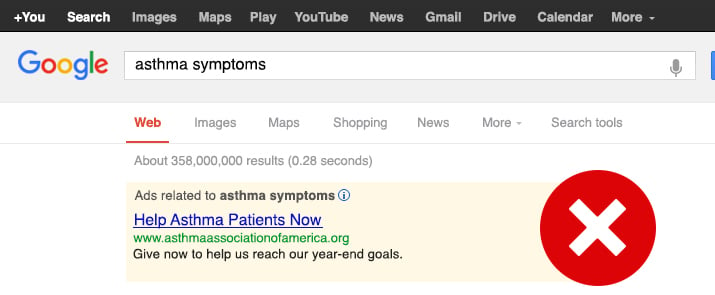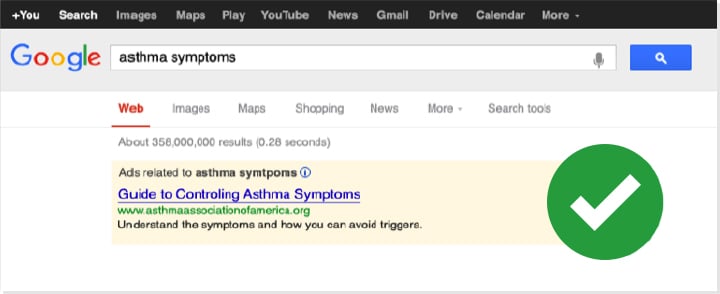When you first get $10,000 in Google Grant advertising credits, you’re going to be excited. But the honeymoon phase ends quickly when you run into some of the common problems many nonprofit organizations face. This could be dealing with tracking issues, having trouble with developing campaigns, or just not seeing the performance you want.
If your organization needs some help, this guide will get you started.
The most important piece of advice we can give you is this: Treat your Google Grant the same way you’d handle a $10,000 paid media budget.
Google Ad Grants are not Monopoly money. They are an incredibly valuable asset that deserves the same time, attention, and strategy you spend in any other channel.

Problem 1: I’m not getting very much traffic
There are several reasons you’re not getting as much traffic as you want.
You don’t have enough campaigns
A healthy Google Grant account generally has 4 to 8 distinct campaigns. A campaign has a focus, clear goals, and centers around a unique topic. Brand terms would be an example of a campaign.
Your keywords aren’t right for you
Even if you’ve added 10,000 keywords, you may still be getting only a trickle of traffic. There are two causes to troubleshoot. You may be targeting extremely competitive search terms with high cost-per-click bids. If you’re bidding for the keyword “nonprofit donations,” you will be beat out of the market. To fix this problem you can remove these terms from your account or move these search campaigns to a paid digital media account where you can bid at higher rates.
Alternatively, you may have picked lots of keywords with low search volume. A very specific keyword may be relevant to your mission, but that doesn’t mean users are searching for that term. Remember, people use Google to access information. Make sure your campaigns and keywords give the user what they want.
You have low quality scores
In order to deliver a quality search experience to its users, Google constantly judges your campaigns. Google evaluates keywords, landing pages, and ad text to generate a score between 1 and 10. If quality scores are low, Google is concerned your ads will cause its users to have a bad search experience. Try selecting different keywords and rewriting your ad copy. If this doesn’t work, contact your developers, and ask them to make changes to your page, or meet with your digital marketing team to consider a new strategy.
Problem 2: My campaigns aren’t performing well
This is a common problem. In all the accounts we analyze, the primary problem is the underlying Google Grant strategy is wrong.
Search engine marketing is distinctly different from display or social advertising. Search engine users are looking for information. This means that your campaigns need to serve the user’s needs by providing that relevant information. Here is an example to demonstrate the point:

The above ad isn’t meeting the user’s need. This is an ad that would be better suited for display. Why? It isn’t answering the user’s underlying question.

Problem 3: I can’t track conversions
AdWords lets you generate a small piece of JavaScript that communicates data from your site back to the AdWords interface. The Conversions panel is found in the Tools section in the header. Generate a unique code for each conversion action, and install it on the page that marks the completed action. This might be the receipt for a completed donation or the page thanking users for subscribing to the email newsletter.
Often times it’s not that simple. Here are some common technical challenges you may face:
- Cross domain tracking issues – your analytics may be setup in such a way that the domain your donations reside on isn’t connected to your organizations domain.
- Lack of a thank you page – sometimes sites are designed without thank you pages when people make a donation or give their email
- Platform limitations – some CMS's mangle tracking codes or create technical barriers to implementations
These are technical challenges that need to be worked through with an experienced development team. RKD has been working with nonprofit software platforms for more than 14 years and has created a database of common implementation issues and their solutions. If your team hits a roadblock, we can certainly help.
One tool that can make your life easier is Google Tag Manager. This platform allows you to store and deploy all of those tracking tags from one central dashboard and includes a lot of options to work around the problems you’re likely facing.
Problem 4: I’m getting domain errors
The Google Grant can only direct traffic to a single domain. It is one of the lesser-known, but important, limitations of the Google Ad Grants program. This means the site domain that you chose when applying for the Grant is the only domain to which you can direct your ads.
Many nonprofit organizations have donation or email management platforms that live on a different domain than their main site, or maybe you have a subsite for a branch of the organization. The Google Grant will not allow you to send traffic these pages, causing ads to be disapproved.
There are a number of solutions to this common problem. A special secondary application can be used to grant permissions to advertise microsites or subsites, but this solution won’t function for donation platforms. Our team of developers can fix this problem by using an iframe to import your donation platform on a page that lives on your domain. Alternatively, a vanity URL is a helpful way to mask your donation platform so that it exists as a subdomain of your main site.
Problem 5: My team isn’t paying enough attention to the account
If you already have an active digital marketing program, adding the responsibilities of AdWords management to the mix is a huge challenge. Keep in mind: one of the requirements for maintaining your Google Grant is regular maintenance at least every two months, but a strong AdWords program will be optimized much more frequently.
You may need a dedicated resource to focus on digital media advertising, or perhaps your existing staff needs additional training to manage digital media more efficiently. RKD recommends daily, weekly and monthly reviews of the account. By developing a schedule and process for monitoring your account you will uncover very important insights such as:
- Where quality scores have dropped
- Which ads are performing best
- Identifying new keyword opportunities
Regardless, keep in mind that digital media is an important channel to consider as part of your overall fundraising program. It can easily be 50% more cost-effective for your organization to outsource digital media management instead of hiring dedicated staff or training existing employees.
Problem 6: I’m not receiving very many donations
This is the most difficult problem to solve and is a result of many factors. Your organization may not have enough brand awareness to drive qualified search traffic, or maybe your donation form is experiencing errors. However, the most common reason we find for this problem is mismanaged expectations.
First, don’t make donations your only goal. You need to consider the entire ecosystem of actions you can persuade users to take. PDF downloads, video views, social actions, and page engagements are incredibly important.
You might have come into using your Grant with unrealistic expectations. $10,000 sounds like a massive budget, and there is a tendency to think all of that money will have an immediate return on donations. The truth is search marketing is one channel in your overall media mix with a specific function. Information seeking users are far more likely to convert by giving their email address than by making a donation.
Don’t ignore the total program impact that digital media generates. It’s easy to look past important metrics like the impressions your ads get, the traffic driven to your website, and the brand exposure created from your search campaigns. Many organizations experience a net lift in their other channels by running digital media campaigns beyond the direct response attributed conversions.
The key point is to create a strategy for your grant that utilizes a variety of goals, not just donations.





Leave a comment: